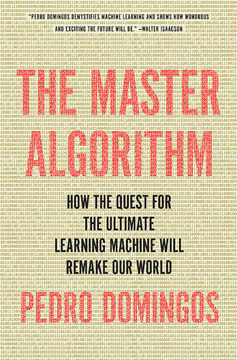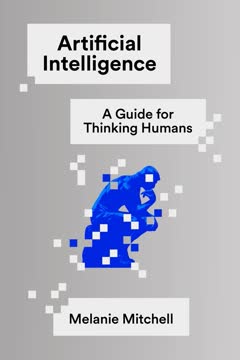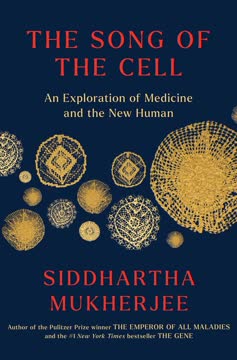Key Takeaways
1. AI is transforming healthcare, offering both promise and peril
"AI is probably the most important thing humanity has ever worked on. AI is… more profound than electricity or fire."
AI in healthcare is a double-edged sword:
-
Promise:
- Improved diagnostic accuracy
- Enhanced efficiency in medical workflows
- Personalized treatment plans
- Early disease detection
-
Peril:
- Potential job displacement
- Privacy concerns
- Ethical dilemmas
- Over-reliance on technology
The integration of AI in medicine is inevitable, but its implementation must be carefully managed to maximize benefits while mitigating risks. The ultimate goal is to use AI as a tool to augment human capabilities, not replace them, leading to better patient outcomes and a more efficient healthcare system.
2. Shallow medicine: The current crisis in patient care and diagnosis
"We've got to contend with them both. Even in the very uncommon situations when a physician's knowledge of a patient is fairly deep and a near-comprehensive dataset can be assembled, all the shortcomings of human thought and the limited scope of human experience come into play."
The current state of healthcare is characterized by:
- Rushed patient encounters (average 7-12 minutes)
- High rates of misdiagnosis (12 million per year in the US)
- Physician burnout and depression
- Overreliance on unnecessary tests and procedures
These issues stem from:
- Increasing administrative burdens
- Pressure to see more patients
- Inadequate time for thorough examinations
- Cognitive biases affecting decision-making
The result is a healthcare system that often fails to provide optimal care, leading to patient dissatisfaction, medical errors, and increased costs. This "shallow medicine" approach undermines the core values of healthcare and sets the stage for the need for a fundamental transformation in how medicine is practiced.
3. Deep learning algorithms are revolutionizing medical imaging and diagnosis
"If you watch radiologists do what they do, [you're] absolutely convinced that they are like superhuman."
AI is reshaping medical imaging in several ways:
- Improved accuracy: AI algorithms can detect subtle patterns humans might miss
- Increased efficiency: Faster image processing and interpretation
- Enhanced consistency: Reducing variability in diagnoses between practitioners
Examples of AI applications in imaging:
- Detecting diabetic retinopathy from retinal scans
- Identifying cancerous lesions in mammograms
- Analyzing brain MRIs for early signs of Alzheimer's disease
While AI shows promise in outperforming humans in specific tasks, it's important to note that these systems are narrow in scope and lack the broader context and judgment of experienced clinicians. The future likely involves a collaborative approach, with AI augmenting rather than replacing human expertise in medical imaging and diagnosis.
4. AI's impact extends beyond pattern recognition to all areas of healthcare
"Either shallow or fast medicine, by itself, is a significant problem. We've got to contend with them both."
AI is transforming various aspects of healthcare:
- Clinical decision support systems
- Predictive analytics for patient outcomes
- Automated administrative tasks
- Personalized treatment plans
Areas of impact:
- Primary care: AI-assisted triage and diagnosis
- Surgery: Robot-assisted procedures and surgical planning
- Mental health: Chatbots for therapy and mood tracking
- Public health: Disease outbreak prediction and management
The widespread adoption of AI in healthcare presents challenges, including:
- Integration with existing systems
- Data privacy and security concerns
- Regulatory hurdles
- Ensuring equitable access to AI-enhanced care
As AI continues to evolve, it has the potential to address many of the systemic issues in healthcare, improving efficiency, accuracy, and patient outcomes across all medical specialties.
5. The promise of AI in drug discovery and biomedical research
"Proper interpretation and use of computerized data will depend as much on wise doctors as any other source of data in the past."
AI is accelerating drug discovery through:
- Analysis of vast chemical databases
- Prediction of drug-target interactions
- Optimization of clinical trial design
- Identification of potential side effects
Key advantages of AI in research:
- Faster hypothesis generation
- More efficient data analysis
- Identification of complex patterns in biological systems
- Reduction in research costs and time-to-market for new drugs
Examples of AI applications:
- DeepMind's AlphaFold for protein structure prediction
- Atomwise's use of deep learning for virtual drug screening
- BenevolentAI's natural language processing for literature analysis
While AI shows great promise in drug discovery and biomedical research, human expertise remains crucial for interpreting results, designing experiments, and making ethical decisions. The synergy between AI and human researchers has the potential to dramatically accelerate the pace of scientific discovery and innovation in medicine.
6. Personalized nutrition through AI and microbiome analysis
"Everything was personal."
AI is revolutionizing nutrition science by:
- Analyzing individual gut microbiome compositions
- Predicting personalized glycemic responses to foods
- Tailoring diet recommendations based on genetic and metabolic factors
Key findings from microbiome research:
- High variability in individual responses to the same foods
- Gut bacteria composition strongly influences glycemic response
- Traditional "one-size-fits-all" dietary advice is often ineffective
Challenges in personalized nutrition:
- Complexity of data collection and analysis
- Need for long-term studies to validate AI-generated recommendations
- Integration of nutritional advice with other aspects of healthcare
The potential of AI-driven personalized nutrition lies in its ability to provide tailored dietary advice that takes into account an individual's unique biological and environmental factors. This approach could lead to more effective strategies for managing conditions like diabetes, obesity, and other metabolic disorders.
7. The virtual medical assistant: AI's role in consumer health
"Alexa, should I eat this last piece of pizza?"
AI-powered virtual assistants are emerging as powerful tools for consumer health:
- Continuous health monitoring through wearables and smart devices
- Personalized health advice based on real-time data
- Early detection of potential health issues
Potential applications:
- Medication reminders and adherence tracking
- Mental health support through chatbots
- Chronic disease management
- Lifestyle and wellness coaching
Challenges to overcome:
- Ensuring data privacy and security
- Developing user-friendly interfaces for all age groups
- Integrating virtual assistants with existing healthcare systems
- Balancing AI-generated advice with professional medical care
As virtual medical assistants become more sophisticated, they have the potential to empower individuals to take a more active role in managing their health, potentially reducing the burden on healthcare systems and improving overall population health outcomes.
8. Empathy and human touch remain irreplaceable in medicine
"The secret of the care of the patient is caring for the patient."
The importance of human connection in healthcare:
- Empathy builds trust between patients and healthcare providers
- Human touch and presence provide comfort and reassurance
- Effective communication improves patient outcomes and satisfaction
Elements of human-centered care:
- Active listening and giving patients a voice
- Physical examination as a ritual of healing
- Shared decision-making between patients and providers
- Recognition of the emotional and psychological aspects of illness
While AI can augment many aspects of medical practice, it cannot replicate the nuanced, empathetic interactions that are fundamental to the healing process. The challenge lies in leveraging AI to free up time for healthcare providers to focus on these crucial human elements of care.
9. Medical education must evolve to prepare doctors for the AI era
"We select future doctors by their grades in college and the results of the Medical College Admission Test (MCAT)."
Transforming medical education for the AI age:
- Integrating data science and AI concepts into medical curricula
- Emphasizing emotional intelligence and communication skills
- Teaching critical evaluation of AI-generated insights
- Preparing students for interdisciplinary collaboration
Key areas for reform:
- Selection criteria for medical school admissions
- Balancing technical knowledge with humanistic skills
- Continuous learning and adaptation to new technologies
- Ethics training for AI applications in healthcare
The goal of medical education in the AI era should be to produce physicians who can effectively leverage technology while maintaining the core values of compassionate, patient-centered care. This requires a fundamental shift in how we train and evaluate future healthcare professionals.
10. Deep medicine: Restoring the human element through technology
"Machine medicine need not be our future. We can choose a technological solution to the profound human disconnection that exists today in healthcare; a more humane medicine, enabled by machine support, can be the path forward."
The vision of deep medicine combines:
- Comprehensive patient data analysis (deep phenotyping)
- Advanced AI algorithms for diagnosis and treatment planning
- Enhanced human connection and empathy in patient care
Potential benefits:
- More accurate and personalized diagnoses
- Reduced medical errors and unnecessary procedures
- Increased time for meaningful patient-provider interactions
- Improved overall healthcare outcomes and patient satisfaction
Challenges to implementation:
- Resistance to change within healthcare systems
- Ensuring equitable access to AI-enhanced care
- Balancing technological advancement with ethical considerations
- Maintaining patient privacy and data security
Deep medicine represents a paradigm shift in healthcare, leveraging the power of AI to enhance, rather than replace, the human aspects of medical practice. By freeing healthcare providers from routine tasks, AI can create space for more meaningful, empathetic interactions between patients and their caregivers, ultimately leading to a more effective and humane healthcare system.
Last updated:
FAQ
What's Deep Medicine about?
- Focus on AI in Healthcare: Deep Medicine by Eric J. Topol explores how artificial intelligence (AI) can enhance the human aspects of healthcare, making it more personalized and empathetic.
- Integration of Data: The book discusses integrating vast amounts of medical data to create a comprehensive view of individual health, aiming to tailor treatments to each patient's unique needs.
- Future of Medicine: Topol envisions a future where AI and deep learning tools work alongside healthcare professionals to improve patient outcomes and enhance the overall experience of care.
Why should I read Deep Medicine?
- Insightful Perspective: The book provides a unique viewpoint on the intersection of technology and healthcare, emphasizing the need for a balance between AI capabilities and human empathy.
- Practical Applications: Topol illustrates how AI can be applied in real-world scenarios, such as diagnosing diseases and personalizing treatment plans, making it relevant for healthcare professionals and patients.
- Addressing Current Issues: The book tackles pressing issues in healthcare, such as misdiagnosis and burnout among healthcare providers, making it a timely read.
What are the key takeaways of Deep Medicine?
- AI as a Tool, Not a Replacement: Topol emphasizes that AI should enhance, not replace, the human elements of healthcare, fostering deeper connections between patients and providers.
- Importance of Deep Learning: The book highlights the role of deep learning in analyzing complex medical data, leading to more accurate diagnoses and better treatment outcomes.
- Need for Empathy in Medicine: A recurring theme is the necessity of empathy in patient care, with the human touch remaining irreplaceable in understanding and addressing patients' needs.
What are the best quotes from Deep Medicine and what do they mean?
- “The secret of the care of the patient is caring for the patient.”: This quote underscores the importance of empathy in healthcare, suggesting that good medical practice lies in truly understanding and caring for patients.
- “We want the physician—a caring individual and not a machine—to give us time.”: Topol emphasizes that patients desire a personal connection with their healthcare providers, highlighting the need for time and attention in medical interactions.
- “AI in medicine isn’t just a futuristic premise.”: This quote reflects the current reality of AI applications in healthcare, indicating that these technologies are already being utilized to improve patient care and outcomes.
What is the concept of "deep medicine" as defined in Deep Medicine?
- Definition of Deep Medicine: Topol defines "deep medicine" as a model that integrates advanced AI tools with a deep understanding of individual patients, enhancing human aspects of care.
- Three Components: The model consists of deep defining of individuals, deep learning for accurate diagnostics, and deep empathy to foster meaningful patient-provider relationships.
- Transforming Healthcare: The concept advocates for a transformation in healthcare where technology and human connection coexist, leading to a more personalized and effective healthcare system.
How does AI improve medical diagnosis according to Deep Medicine?
- Pattern Recognition: AI excels at recognizing patterns in large datasets, leading to more accurate diagnoses, such as identifying abnormalities in medical images.
- Data Integration: AI integrates various types of data to provide a comprehensive view of a patient's health, enhancing diagnostic accuracy and treatment planning.
- Real-World Applications: Topol provides examples of AI applications in diagnosing conditions like skin cancer and heart disease, demonstrating improved patient outcomes.
What are the limitations of AI in healthcare as discussed in Deep Medicine?
- Black Box Problem: A significant limitation is the "black box" nature of many AI algorithms, where the decision-making process is not transparent, hindering trust.
- Bias and Inequities: AI systems can perpetuate existing biases present in the training data, leading to inequitable healthcare outcomes.
- Dependence on Data Quality: The effectiveness of AI is heavily reliant on the quality and comprehensiveness of the data used for training, affecting predictions and diagnoses.
How does Deep Medicine address the issue of empathy in healthcare?
- Empathy as Essential: Topol argues that empathy is a critical component of effective healthcare, emphasizing that technology should enhance, not replace, the human connection.
- Impact of Burnout: The book discusses how technology can contribute to physician burnout, affecting patient care quality, and stresses restoring empathy in medicine.
- Training for Emotional Intelligence: Topol suggests prioritizing emotional intelligence and communication skills in medical training to cultivate healthcare providers who can effectively connect with patients.
What role does data play in the future of healthcare as envisioned in Deep Medicine?
- Big Data Utilization: The book highlights the importance of utilizing big data to inform medical decisions and improve patient outcomes.
- Personalized Medicine: By integrating diverse data sources, healthcare can become more personalized, allowing for tailored treatment plans.
- Continuous Learning: Topol envisions AI systems continuously learning from new data, leading to ongoing advancements in medical knowledge and practice.
How does Deep Medicine propose to change the healthcare system?
- Integration of AI and Human Care: Topol advocates for a healthcare system that seamlessly integrates AI tools with compassionate human care.
- Empowering Patients: The book emphasizes empowering patients by providing access to their health data and involving them in decision-making processes.
- Reforming Medical Education: Topol calls for reforms in medical education to prioritize both technical skills and emotional intelligence.
How does Deep Medicine address the role of AI in diagnostics?
- Enhanced Diagnostic Accuracy: AI can analyze vast amounts of data to improve diagnostic accuracy, particularly in fields like radiology and pathology.
- Predictive Analytics: The book highlights AI's use in predicting patient outcomes, allowing for more proactive and personalized care.
- Integration with Clinical Practice: Topol emphasizes the need for AI tools to complement rather than complicate healthcare providers' work.
What ethical considerations does Deep Medicine raise regarding AI in healthcare?
- Data Privacy and Security: Topol stresses the importance of protecting patient data as AI systems become more prevalent in healthcare.
- Bias in Algorithms: The book discusses potential biases in AI algorithms, calling for transparency and accountability to ensure equitable treatment.
- Human Oversight: Topol argues for human oversight to ensure ethical and compassionate care, warning against over-reliance on technology.
Review Summary
Deep Medicine explores AI's potential to transform healthcare by improving diagnosis, freeing up doctors' time, and restoring the human touch in medicine. Reviewers praised Topol's comprehensive overview of AI applications in healthcare and his balanced perspective on its promises and limitations. Many appreciated his vision of AI enhancing rather than replacing human doctors. Some readers found the writing style dry or technical at times. Overall, the book was seen as an important and timely examination of AI's role in shaping the future of medicine.
Similar Books










Download PDF
Download EPUB
.epub digital book format is ideal for reading ebooks on phones, tablets, and e-readers.




